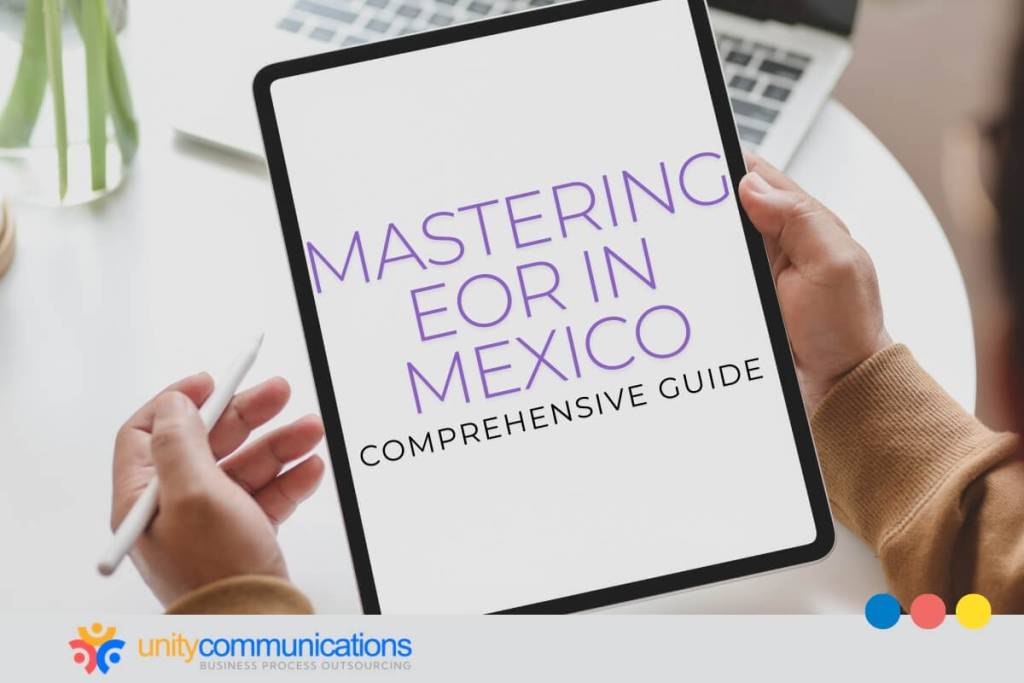IN THIS ARTICLE
Table of Contents
An employer of record (EOR) in Mexico is a service provider that takes on the legal responsibilities of managing employees on behalf of another company. It handles critical responsibilities such as payroll, taxes, benefits, and labor compliance.
This article explores how EOR Mexico supports foreign employers in navigating the country’s complex regulatory environment. Keep reading to gain a deep understanding of EOR’s critical role in business expansion in Mexico.
Understanding EOR in Mexico

Expanding operations into Mexico can be challenging, particularly when managing local employment regulations. An employer of record can simplify this process.
An EOR is a service provider that legally employs workers on behalf of a company, handling all administrative tasks in compliance with local labor laws. By acting as the official employer, the EOR ensures the business meets all regulatory requirements and focuses on its operations.
Mexican labor market and economic landscape
A diverse workforce and a mix of formal and informal employment characterize the Mexican labor market. With a large population and a growing economy, Mexico offers a broad talent pool across various industries, from manufacturing to technology.
However, the labor market faces challenges, including varying regional economic conditions, a significant informal sector, and evolving labor laws to improve worker rights and conditions.
International trade through agreements such as the United States-Mexico-Canada Agreement (USMCA) shapes the country’s economy. It benefits from a strategic geographic location and strong trade relationships with the U.S. and other global partners.
Despite these advantages, political stability, inflation, and economic reforms also influence the country’s business operations and labor market dynamics. Understanding these conditions, EOR services in Mexico can effectively support businesses navigating the local market.
The legal framework
Foreign companies that want to hire Mexican professionals must understand the country’s labor laws and policies that protect workers’ rights and establish clear standards for employment practices. Understanding them helps maintain a harmonious workplace and compliant operations.
Here are essential regulations that govern the Mexican labor market:
- Federal Labor Law governs contracts, working conditions, and employee rights, including wages, hours, and vacations.
- Social Security Law requires employer contributions for employee healthcare, pensions, and other benefits.
- Occupational Safety and Health Regulations set safety standards, including protective equipment and hazardous material protocols.
- Labor Relations Law regulates collective bargaining, union activities, and dispute resolution.
- Employment Termination Rules outline lawful termination procedures and severance pay requirements.
How EOR services navigate the complexities of Mexican employment law
Due to the country’s detailed and evolving regulations, Mexican employment laws can be complex. EOR services manage compliance and administrative tasks for businesses, streamlining the employment process.
The following are EOR expertise that helps companies meet all legal requirements, minimize risks, and operate smoothly:
- Leverage in-depth knowledge of Mexican labor laws to comply with regulations and standards.
- Handle payroll processing, including accurate tax calculations and timely submissions to the relevant authorities.
- Manage employee benefits, such as health insurance and retirement contributions, according to Mexican regulations.
- Draft and maintain employment contracts that comply with local legal requirements and protect employer and employee rights.
- Stay current with changes in labor laws and regulations to maintain compliance and adjust practices as needed.
Business process outsourcing (BPO) companies might also offer EOR services. Leveraging EOR services through an outsourcing firm also promotes compliance with local labor laws in BPO.
Benefits of using EOR services in Mexico

Understanding the benefits of EOR services can provide valuable insights into how they enhance efficiency and mitigate risks for growing businesses in Mexico. These advantages range from cost-effectiveness to seamless workforce management.
Read on to learn more:
- Reduces recruitment costs and streamlines the hiring process by leveraging local expertise
- Avoids legal pitfalls and guarantees adherence to Mexican labor laws, reducing the risk of penalties and legal issues
- Streamlines payroll processing, benefits administration, and human resources (HR) tasks through the EOR
- Provides access to in-depth knowledge of local labor laws and practices to navigate the regulatory landscape effectively
- Scales operations without investing heavily in local infrastructure or HR resources
- Allows the in-house team to concentrate on strategic goals and growth initiatives rather than administrative tasks
- Accelerates entry into the Mexican market with a ready-to-go workforce and established local compliance measures
Hiring through EOR services in Mexico
EOR services in Mexico simplify recruitment by leveraging local expertise to handle employment and compliance tasks. Below is a step-by-step guide outlining how businesses can efficiently onboard new talent while adhering to Mexican labor laws:
- Define hiring needs. The company outlines the job roles, responsibilities, and qualifications required.
- Collaborate with EOR. The firm works with the EOR to create a detailed job description and recruitment plan.
- Recruit and screen. The EOR manages the recruitment process, including sourcing candidates, conducting interviews, and performing background checks.
- Complete the offer and contract. The EOR handles the offer letters and drafts employment contracts.
- Handle work permits. If applicable, the EOR manages the employees’ work permits and visa requirements.
- Manage employee benefits. The EOR administers employee benefits, such as health insurance and retirement contributions, in compliance with the legal aspects of employee benefits.
- Facilitate onboarding with employer of record. The EOR sets up payroll and seamlessly integrates the new employee into the organization.
Cultural considerations and best practices for team integration
Integrating a team into a new culture requires thoughtful consideration and adaptation to local practices and values. Understanding cultural nuances and implementing best practices can enhance team cohesion and productivity. This is where EOR services in Mexico are advantageous.
An EOR firm implements the following best practices and cultural considerations to streamline team integration and build a strong foundation for long-term success:
- Understand local communication styles. Mexicans value personal relationships and often use indirect communication. Pay attention to nonverbal cues and offer feedback respectfully.
- Respect hierarchical structures. Show respect for seniority and use formal titles and protocols.
- Foster relationship building. Spend time with team members through informal gatherings to build trust.
- Encourage inclusivity. Share cultural experiences to enrich team activities.
- Provide cultural training. Offer cultural sensitivity training to avoid misunderstandings and create a more inclusive environment.
EOR comparison with other countries

Understanding the differences between EOR in Mexico, the U.S., Canada, and other Latin American countries reveals distinct advantages and considerations for each region. The comparisons below inform business decisions about where to operate and how to manage an international workforce effectively.
Mexico vs. the U.S.
EOR services in Mexico are more cost-effective than in the U.S., where labor costs and state-specific regulations add complexity. Mexico’s centralized laws simplify compliance compared to the U.S.’s varied state regulations. A Mexican EOR focuses on local laws and cultural nuances, whereas a U.S.-based EOR handles a broader range of state-specific issues.
Mexico vs. Canada
Mexico’s labor laws are more straightforward than Canada’s multi-jurisdictional regulations. Due to the country’s stringent employment standards, EOR services in Canada tend to be more expensive, making Mexico more budget-friendly. While Canadian EOR firms face higher benefit requirements, Mexican EOR providers offer competitive benefits aligned with local standards.
Mexico vs. other Latin American countries
Mexico’s labor laws and EOR services are generally cohesive with other Latin American countries but are often more cost-effective and efficient. Despite regional similarities, Mexico stands out for its balance of affordability, regulatory simplicity, and local expertise.
Unique advantages and challenges of the Mexican market
The Mexican market offers logistical benefits due to its proximity to the U.S., a growing economy with increasing consumer purchasing power, and advantages from free trade agreements such as the USMCA and European Union deals. Its rich cultural heritage also helps connect local consumers.
However, challenges include a complex regulatory environment, security concerns, economic volatility, infrastructure limitations, and cultural differences that require effective cross-cultural communication and training. Understanding these factors is crucial for developing strategies tailored to the local market.
Selecting the right EOR in Mexico is crucial for successfully navigating these challenges, ensuring compliance, managing risks, and optimizing operations in this dynamic market.
Understanding EOR vendor selection in Mexico
Working with the right EOR is crucial for smooth operations, total compliance, and effective workforce management in the Mexican market. Here’s how to choose an employer of record in Mexico:
- Verify whether the EOR offers payroll, benefits, work permits, and compliance services.
- Review the EOR’s pricing and watch for hidden fees.
- Check the firm’s compliance management, including tax filings and contracts.
- Select a provider with responsive customer support and clear communication.
- Choose an EOR that can scale with the business’s growth.
- Assess its payroll and HR technology, especially its efficiency and reporting.
Stories of successful EOR partnerships

Discover how companies have effectively leveraged employer of record services to navigate the complexities of expanding into new markets. These success stories highlight practical benefits, key strategies, and valuable lessons.
U.S. tech firm expands with EOR’s expertise
BlueByte Technologies, a small IT solutions provider, faced significant challenges managing HR responsibilities and compliance while expanding into new markets. The company struggled with legal issues due to non-compliance with state and federal labor laws, resulting in penalties and additional expenses.
To address these issues, BlueByte outsourced its employment responsibilities. This decision led to a 30% reduction in HR costs by eliminating the need for in-house HR staff and training. Additionally, the EOR complied with labor laws, helping BlueByte avoid legal problems and improve employee management, productivity, and satisfaction.
Advertising firm’s smooth expansion with EOR support
BoldBrand Advertising, a mid-sized marketing firm, faced difficulties managing payroll, benefits, and taxes while keeping up with evolving labor laws in a new market. These challenges led to compliance issues and increased costs for maintaining an in-house HR team.
Outsourcing its co-employment responsibilities reduced HR expenses by 25% and removed the need for costly payroll and tax management tools. The provider ensured adherence to labor laws to avoid fines and legal troubles. It also offered valuable insights into employee management to improve retention and satisfaction.
The bottom line
Utilizing EOR services in Mexico offers numerous benefits for business expansion. Examples include cost-effectiveness, streamlined hiring processes, and comprehensive labor compliance. These services facilitate smooth operations by handling payroll, benefits, and regulatory requirements, allowing businesses to focus on their core activities.
Learn more about how EOR services in Mexico can boost employee management and simplify regional business operations. Let’s connect!





